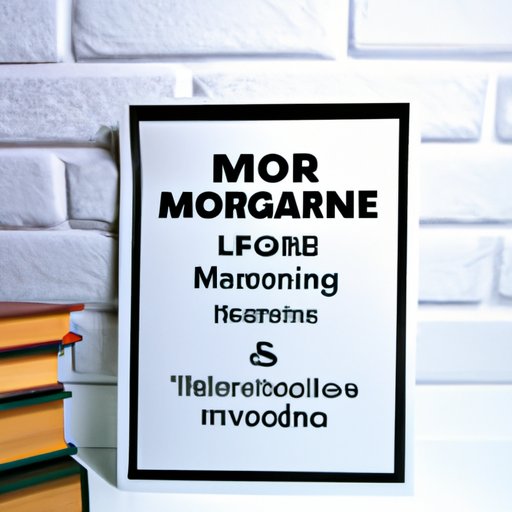
How to Become a Mortgage Loan Officer: A Complete Guide
If you are interested in the mortgage loan industry and have excellent communication and sales skills, becoming a mortgage loan officer could be an ideal career path. As a mortgage loan officer, you help individuals and families finance their dream homes and other real estate investments. This article provides an in-depth guide on how to become a mortgage loan officer, including educational requirements, qualifications, tips for success, and career prospects.
Step-by-step Guide on Becoming a Mortgage Loan Officer
The basic steps for becoming a mortgage loan officer are:
Education Requirements
The first step to becoming a mortgage loan officer is to obtain a high school diploma or an equivalent degree. However, most mortgage loan officers have a bachelor’s degree in business, finance, economics, or a related field. Completing courses in accounting, statistics, and business management can be beneficial.
Licensing and Certifications
All mortgage loan officers must be licensed in the state they work in. The requirements vary by state, but most require passing an exam, attending pre-licensing courses, and providing financial and personal information. Additionally, some mortgage loan officers choose to obtain certifications such as the National Mortgage Loan Originator (NMLS) license and the Certified Mortgage Planning Specialist (CMPS) certification, which can improve their job prospects and income.
Necessary Experience, Skills, and Traits to Become Successful
Although not required, experience in financial services or sales can be helpful to become a successful mortgage loan officer. Additionally, important skills and traits for success in this field include:
- Excellent communication and customer service skills
- Ability to work under pressure and meet deadlines
- Attention to detail and accuracy
- Confidence and persuasive skills

Qualifications Needed to Become a Mortgage Loan Officer
Obtaining a mortgage loan officer license is typically the primary qualification needed to work in the industry. The specific qualifications for licensing vary by state and typically include education, experience, background checks, and passing an exam.
Additionally, some employers may prefer or require candidates to have a bachelor’s degree in finance, business, or a related field, as well as relevant experience in lending, sales, or customer service.
Certifications such as NMLS or CMPS can help demonstrate expertise in the field and increase job prospects and income.
Tips on How to Become a Successful Mortgage Loan Officer
Here are some tips for becoming a successful mortgage loan officer:
How to Build a Network
Networking is essential for success in the mortgage loan industry. Attend industry conferences, events, and seminars in your area, join local and national mortgage industry associations, and connect with agents, builders, and other professionals in the real estate industry. Building a network can help you establish credibility and generate referrals.
How to Gain Experience
Working at a bank, credit union, or mortgage brokerage company can provide valuable experience and exposure to different types of mortgages, customer service, and sales. Consider an internship or entry-level position if you are a recent graduate or transitioning from another field, to gain practical skills and knowledge.
How to Stay Ahead of the Competition
Stay up-to-date with changing regulations, market trends, and technology advancements in the mortgage industry. Attend training sessions, read industry publications, and take continuing education courses to ensure you are knowledgeable and competitive in the field. Additionally, provide exceptional customer service, be responsive, and follow up with clients to generate referrals.
Navigating the Hiring Process as a Mortgage Loan Officer
The hiring process for mortgage loan officers typically involves several steps, including submitting an application, undergoing a background check and credit check, passing an exam, and attending an interview.
Insight into the Type of Questions to Expect During the Interview
During the interview, you may be asked about your education, work experience, customer service skills, knowledge of the mortgage industry, and sales experience. It is essential to demonstrate your communication skills, ability to work under pressure, and persuasive skills.
Guidance on How to Answer Interview Questions
When answering interview questions, aim to provide detailed and concise responses that showcase your qualifications and experience. Provide examples of situations where you demonstrated your skills, such as working with a difficult customer, and explain how you handled the situation. Additionally, ask thoughtful questions about the company culture and job responsibilities to demonstrate your interest in the position.
The Traits of Successful Mortgage Loan Officers
Successful mortgage loan officers possess several important traits and skills, including:
Importance of Communication Skills
Effective communication skills are critical to succeed in the mortgage loan industry. Mortgage loan officers must be able to communicate complex financial concepts to clients and industry professionals clearly, listen to clients’ needs and concerns, and negotiate with lenders on behalf of clients.
Importance of Empathy
Mortgage loan officers must be able to empathize with clients’ emotions during the home-buying process. Buying a home is often an emotional and stressful process, and mortgage loan officers must be able to offer reassurance and support to clients while providing accurate information and advocating on their behalf.
Importance of Salesmanship
Mortgage loan officers must possess excellent sales skills to succeed in the field. They must be able to persuade clients to choose their services, negotiate with lenders to secure favorable terms, and build a network of clients and industry professionals to generate referrals.
Understanding the Roles and Responsibilities of a Mortgage Loan Officer
The primary responsibility of a mortgage loan officer is to help clients secure a mortgage to purchase or refinance a home or real estate investment. The daily tasks of a mortgage loan officer include:
- Evaluating borrowers’ creditworthiness
- Explaining different types of mortgages and their terms to clients
- Assisting clients with loan applications and documentation
- Negotiating with lenders on behalf of clients
- Facilitating the mortgage closing process
- Providing ongoing customer service and relationship management
The roles and responsibilities of a mortgage loan officer may vary depending on the type of lender they work for, such as banks, credit unions, or mortgage brokerage companies.
Career Prospects in the Mortgage Loan Industry
Becoming a mortgage loan officer can open up many career opportunities in the industry, including:
- Branch Manager
- Loan Processor
- Underwriter
Mortgage loan officers can also specialize in different types of mortgages, such as government-backed loans, jumbo loans, or commercial loans, and work in different areas of the country with varying housing markets.
Conclusion
Becoming a mortgage loan officer requires a combination of education, licensing, experience, and skillsets. By following the step-by-step guide provided in this article, candidates can position themselves for success in the industry. It is a rewarding and lucrative career path that can offer flexibility, continuous learning, and growth opportunities. We encourage aspiring mortgage loan officers to pursue their goals and take advantage of the tips and insights provided in this article.




